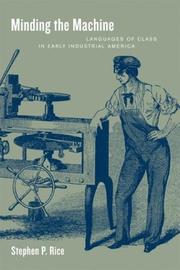| Listing 1 - 2 of 2 |
Sort by
|
Book
ISBN: 271321825X 9782713218255 Year: 2004 Volume: 102 Publisher: Paris : Éditions de l'École des Hautes Études en Sciences Sociales - EHESS,
Abstract | Keywords | Export | Availability | Bookmark
 Loading...
Loading...Choose an application
- Reference Manager
- EndNote
- RefWorks (Direct export to RefWorks)
Capitalism --- Industrial revolution --- Industrialization --- Capitalisme --- Révolution industrielle --- Industrialisation --- History --- Histoire --- United States --- Etats-Unis --- Economic conditions --- Conditions économiques --- US / United States of America - USA - Verenigde Staten - Etats Unis --- 331.12 --- 331.100 --- 331.154 --- Geschiedenis van de industrie. --- Economische geschiedenis: algemeenheden. --- XVIIe, XVIIIe eeuw. Fysiocratie. --- Révolution industrielle --- Conditions économiques --- Revolution, Industrial --- Industrial development --- Economische geschiedenis: algemeenheden --- Geschiedenis van de industrie --- XVIIe, XVIIIe eeuw. Fysiocratie --- Economic history --- Social history --- Economic development --- Economic policy --- Deindustrialization --- Industrial revolution - United States - History - 19th century. --- Industrialization - United States - History - 19th century. --- États-Unis --- 19e siècle --- Jusqu'à 1865

ISBN: 0520926579 9786612356377 1282356372 159734754X 9780520926578 9781597347549 1417545291 9781417545292 0520227816 9780520227811 9781282356375 Year: 2004 Publisher: Berkeley, Calif. University of California Press
Abstract | Keywords | Export | Availability | Bookmark
 Loading...
Loading...Choose an application
- Reference Manager
- EndNote
- RefWorks (Direct export to RefWorks)
In this innovative book, Stephen P. Rice offers a new understanding of class formation in America during the several decades before the Civil War. This was the period in the nation's early industrial development when travel by steamboat became commonplace, when the railroad altered concepts of space and time, and when Americans experienced the beginnings of factory production. These disorienting changes raised a host of questions about what machinery would accomplish. Would it promote equality or widen the distance between rich and poor? Among the most contentious questions were those focusing on the social consequences of mechanization: while machine enthusiasts touted the extent to which machines would free workers from toil, others pointed out that people needed to tend machines, and that that work was fundamentally degrading and exploitative. Minding the Machine shows how members of a new middle class laid claim to their social authority and minimized the potential for class conflict by playing out class relations on less contested social and technical terrains. As they did so, they defined relations between shop owners-and the overseers, foremen, or managers they employed-and wage workers as analogous to relations between head and hand, between mind and body, and between human and machine. Rice presents fascinating discussions of the mechanics' institute movement, the manual labor school movement, popular physiology reformers, and efforts to solve the seemingly intractable problem of steam boiler explosions. His eloquent narrative demonstrates that class is as much about the comprehension of social relations as it is about the making of social relations, and that class formation needs to be understood not only as a social struggle but as a conceptual struggle.
Social classes in literature. --- Work in literature. --- Industrial revolution --- Social classes --- Revolution, Industrial --- Economic history --- Social history --- Class distinction --- Classes, Social --- Rank --- Caste --- Estates (Social orders) --- Social status --- Class consciousness --- Classism --- Social stratification --- History --- Social classes -- United States -- History -- 19th century.. --- Industrial revolution -- United States -- History -- 19th century.. --- Work in literature.. --- antebellum america. --- civil war. --- class conflict. --- class formation. --- class relations. --- economic history. --- engineer. --- explosions. --- factory production. --- factory workers. --- foremen. --- industrial development. --- industrial revolution. --- labor industrial relations. --- labor movements. --- labor. --- management. --- manual labor. --- marxism. --- mechanic institutes movement. --- mechanization. --- middle class. --- nonfiction. --- poverty. --- railroad. --- steam boiler. --- steamboat. --- united states. --- wage workers. --- wealth gap. --- working class. --- working conditions.
| Listing 1 - 2 of 2 |
Sort by
|

 Search
Search Feedback
Feedback About UniCat
About UniCat  Help
Help News
News